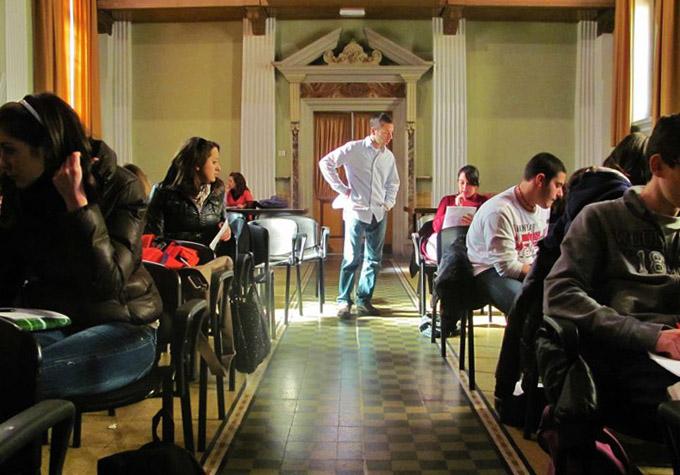Playing the Part

Elisha Corso-Phinney '10, SITE intern at ITS Luca Pacioli High School in Crema, Italy, leads a class.
For students headed to Italy as part of the SITE program, it’s all about 'calarsi nel ruolo'
by Tony Moore
Let’s say you’ve been studying Italian at Dickinson for a few years. Your classes have prepared you to speak, read and write in Italian. You study Italian culture, chat with other Italian majors and professors in Italian, follow the World Cup in La Gazzetta dello Sport.
You’ve become mildly obsessed with how certain Italian words share their Latin roots with certain English words, and you start to notice that you think in Italian sometimes, that it’s really seeping into who you are on a day-to-day level.
In other words, you’re all in.
So at this point, you’re ready for what Luca Trazzi, visiting lecturer in Italian and Dickinson’s SITE contact, calls “a rewarding combination of life, work and cultural experiences that very few internships can offer.”
Ready all along
SITE (the Network of Autonomous Schools of the Lombardy Region’s Study and Intercultural Training and Experience) is a cultural exchange program and paid teaching internship that sends graduates to Italy for a full or partial year to teach classes at the secondary-school level. Students filter out of Dickinson, and around 50 other colleges and universities, each year into the program, and it’s nothing short of a life-changing experience.
“The SITE program is a wonderful opportunity,” says Thiago Branco ’13, who majored in Italian studies and Latin American, Latino & Caribbean Studies and is a part of SITE as an “assistente madrelingua inglese,” or “English mother-tongue assistant.” “It’s been developing in the richest region of Italy, and it’s an inestimable chance to understand how teaching works.”
That detail, how teaching works, might be surprisingly nebulous until graduates take the reins in the classroom, and the intensity of the SITE program—the immersive nature of the environment—can be a little intimidating at first blush.
“Many rising seniors or recent graduates do not have previous teaching experience,” says Trazzi, who himself came to Dickinson a decade ago as an exchange student from the University of Bologna. “After telling them not to panic, I explain what I did when I started teaching: Simply look back to when you were a student. Let your favorite professors inspire and guide you.”
They also tap into their Dickinson experiences as they prepare, which invariably leads to the conclusion that, experienced or not, they were ready all along.
“I’m happily throwing myself into it, because spending my junior year abroad in Bologna taught me that I can rise to this kind of challenge,” says Julia Barnes ’14, who majored in French and Italian studies and will head off to Lombardy in 2015. “And [my professors gave me] a solid foundation in my field: No matter how tough things get with my future students, the fact of the matter is that on an academic level I really know what I am doing.”
Living where you live
History major Wilson Riccardo ’12 has been through the program, and for him, inhabiting the role of a resident Italian was at the heart of the experience.
“In every period of my life, I try to really ‘live’ where I live,” he says, noting that the SITE program led him to remain in Italy. “During that period, aside from the teaching itself, my Italian experience involved, as the Italians say, ‘calarsi nel ruolo,’ ‘playing the part.’ ”
Looking back, he realizes that the little details of playing the part (such as continually drinking coffee and never having dinner before 8 p.m.) gave way to something deeper. “In more philosophical terms,” he says, “it meant learning to see the world from another point of view.”
All in, all over again.
Learn more
- SITE program
- Dickinson's international graduate school agreements
- Department of Italian & Italian Studies
- Latest News
Published July 22, 2014